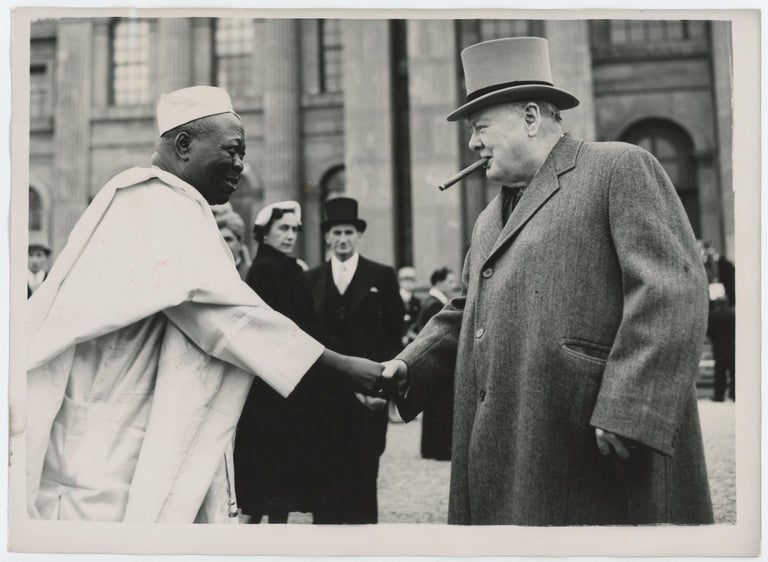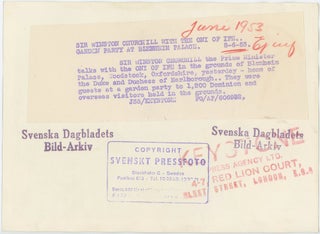An original press photograph of Prime Minister Winston S. Churchill shaking hands with the Ooni of Ife on 8 June 1953 on the grounds of Blenheim Palace during the Commonwealth Prime Ministers Conference
London & Stockholm: Copyright Keystone, London and Svenskt Pressfoto, Stockholm, 8 June 1953. Photograph. This original press photograph captures Prime Minister Winston S. Churchill shaking hands with the Ooni of Ife, ruler of the Yaruba people, on 8 June 1953 on the grounds of Blenheim Palace during the Commonwealth Prime Ministers Conference following the Coronation of Queen Elizabeth II. The gelatin silver print on glossy photo paper measures 6 x 8.125 inches (15.2 x 20.7 cm). Condition is very good. The paper is crisp and clean with only light cockling and scuffing visible under raking light. This is an exceptional photograph, bright and clear with sharp focus, high contrast, and compelling composition.
The verso bears a copyright stamp of “Keystone Press Agency”, a Swedish copyright stamp of “Svenskt Pressfoto”, two stamps of Svenska Dagbladets Bild-Arkiv (Svenska Dagladets is a Stockholm daily newspaper, and bild-arkiv translates to photo archive), and a typed caption dated “8-6-53” and reading, “SIR WINSTON CHURCHILL the Prime Minister talks with the ONI [sic] OF IFE in the grounds of Blenheim Palace, Woodstock, Oxfordshire, yesterday - home of the Duke and Duchess of Marlborough. They were guests at a garden party to 1,200 Dominion and overseas visitors held in the grounds.” Blenheim Palace is Winston’s birthplace and ancestral home of the Churchill family.
While history best remembers Churchill’s wartime premiership, Churchill spent an additional decade at the apex of leadership. After the General Election of July 1945 ended his wartime premiership, Churchill served as Leader of the Opposition until the October 1951 General Election, when his Conservatives outpolled Labour, returning Churchill to 10 Downing Street for his second and final premiership (1951-1955). The events encompassed by these years are in many ways no less dramatic than those of the war years, including post-war recovery, onset of the Cold War, Soviet acquisition of the atomic bomb, development of the hydrogen bomb, coronation of Queen Elizabeth II, the beginning of the space age, and the unraveling of the British Empire.
The last of these events had particular poignancy for Churchill, whose early life and perspective were shaped by his service in Britain’s colonial possessions. By the time he was first elected to Parliament at the age of 25, Churchill had served as a soldier and war correspondent in British colonial campaigns on multiple continents. His first position in Government was Undersecretary of State for the Colonies and he briefly headed the Colonial Office after the First World War. During the early 1930s he broke with his own party over Indian independence. Churchill’s faith in the beneficence and destiny of the British Empire could approach obdurate strength. There was perhaps more than just characteristic wartime defiance in his 1942 utterance, “We have not entered this war for profit or expansion…Let me, however, make this clear… I have not become the King’s First Minister in order to preside over the liquidation of the British Empire. For that task, if ever it were prescribed, someone else would have to be found.” (Complete Speeches, Vol. VI, p.6695)
Nevertheless, swiftly following the war India gained long-sought independence and by Churchill’s second premiership general impetus toward colonial independence was becoming inevitability. Churchill shaking hands with Ooni of Ife Adesoji Aderemi (1889-1980) captures a poignant moment in the Empire’s twilight. The Ooni is the traditional ruler of the Yoruba people, one of Africa’s largest ethnic groups, centered in the region of British colonial Nigeria. Churchill hewed to his promise that no part of the Empire would gain independence under his watch. But soon after Churchill resigned his second and final premiership Sudan gained independence shortly followed by Ghana and Malaya in 1957. Nigerian independence followed in 1960 and Aderemi served as the first Governor of the Western Region from 1960-1962. Item #005572
Price: $300.00


